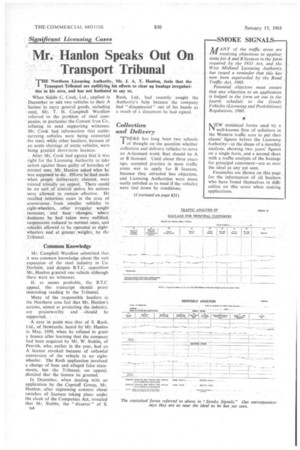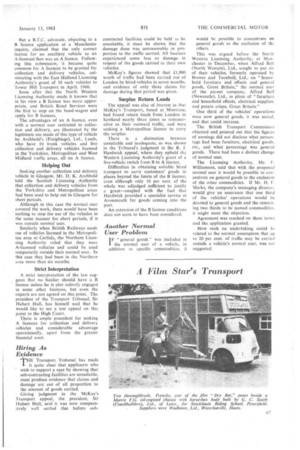Significant Licensing Cases
Page 62

Page 65

If you've noticed an error in this article please click here to report it so we can fix it.
Hanlon Speaks Out On Transport Tribunal
THE Northern Licensing Authority, Mr. J. A. T. Hanlon, feels that the Transport Tribunal are nullifying his efforts to clear up haulage irregularities in his area, and has not hesitated to say so.
. When Siddle-c. Cook, Ltd., applied in December to add two vehicles to their A . licence to carry general goods, including steel, Mr. T. H. Campbell Wardlaw referred to the problem of steel companies, in particular the Consett Iron Co., refusing to send supporting witnesses.
• Mr. Cook had information that cattle • carrying .vehicles were being converted for steel, while other hauliers, because of an acute shortage of ca:ttle vehicles, were being granted short-term licences.
. After Mr. Cook had agreed that it was right for the Licensing Authority to take action against those guilty of breaches of normal user, Mr. Hanlon asked what he was supposed to do. Efforts he had made when people deliberately cheated, were treated trivially on appeal. There could be no sort of control unless his actions were allowed to remain effective. He recalled notorious cases in the area of conversions from smaller vehicles to eight-wheelers, other irregular weight increases, and base' changes, where decisions he had taken were nullified. suspensions reduced to normal ones, and vehicles allowed to be, operated as eightwheelers and at greater weights, by the Tribunal.
Common Knowledge
Mr. Campbell Wardlaw submitted that it was common knowledge about the vast expansion of the steel industry in Co. Durham, and despite B.T.C. opposition Mr,Hanlon granted one vehicle although there were no witnesses.
If, as seems probable, the B.T.C. appeal, the transcript should • prove interesting reading to the Tribunal.
Many of the responsible hauliers in the Northern area feel that Mr. Hanlon's actions, aimed at protecting the industry, are praiseworthy and -.should be supported. • A case in' point was that of S. Rush, Ltd., of Newcastle, heard. by' Mr. Hanlon in May, 1959, when he refused to grant a licence after learning that the company had been acquired by Mr. W. Stubbs, of Penrith, who, earlier in the year, had an A licence revoked because of unlawful conversion of the vehicle to an eightwheeler. The Rush application involved a change of base and alleged false statements, but • the Tribunal, on appeal, directed that the licence be granted.
In December, when dealing with an application by the Capstaff Group, Mr. Hanlon., after expressing concern about switches of licences taking place under the cloak of the Companies Act, revealed that Mr. Stubbs, the "director" of S.
D4 Rush, Ltd., had recently sought the Authority's help because the company had "disappeared" out of his hands as a result of a document he had signed.
Collection and Delivery
THERE has long been two schools
of thought on the question whether collection and delivery vehicles-to serve an A-licensed trunk fleet should be A or B licensed. Until about three years ago, accepte.d practice in most traffic areas was to apply for B licences, because they attracted less objection, and Licensing Authorities were more easily satisfied as to need if the vehicles were tied down by conditions,
But a B.T.C. advocate, .objecting to a B licence application at a. Manchester inquiry, claimed that the only correct licence for an ancillary vehicle to an A-licensed fleet was an A licence. Following this submission, it became quite common for A licences to be granted for collection and delivery vehicles, culminating with the East Midland Licensing Authority's grant of 10 such vehicles to Tower Hill Transport in 'April, 1960. •
Soon after this the North Western Licensing Authority -made it known that in his view a B licence was more appropriate; and British Road Services were the first to step on the band-wagon and apply for B licences.
. The advantages of an A licence, even with a normal user restricted to collection and delivery, are illustrated by the legitimate use made of this type of vehicle by Archbold's (Freightage), Ltd., Leeds, who have 10 trunk vehicles and five collection and delivery vehicles licensed in the Yorkshire, Metropolitan and-West Midland traffic areas, all on A licence.
Helping Out
Seeking another collection and delivery vehicle in Glasgow, Mr. D. K. Archbold told the Scottish Licensing Authority that collection and delivery vehicles from the Yorkshire and Metropolitan areas had been used to help out in Glasgow for short 'periods.
Although in this case the normal user covered the work, there would have been nothing to stop the use of the vehicles in the same manner for .short periods, if it was outside normal user.
Similarly when British Railways made use of vehicles licensed in the Metropolitan area at Carlisle, the Northern Licensing Authority ruled that they were A-licensed vehicles and could be used temporarily outside their normal user. In this case they had been in the Northern area more than six months.
Strict Interpretation
A strict interpretation of the law suggests that no haulier should have a B licence unless he is also actively engaged in some other business, but even the experts are not agreed on this point. The president of the Transport Tribunal, Sir Hubert Hull, has himself said that he would like to sec a test appeal on this point to the High Court.
There is ample precedent for seeking A licences for collection and delivery vehicles and considerable advantage operationally, apart from the greater financial asset.
Hiring As Evidence
E Transport Tribunal has made it quite clear that applicants who wish to support a case by showing that sub-contracting facilities are unsuitable, must produce evidence that claims and damage are out of all proportion to the amount of goods carried.
Giving judgment in the McKay's Transport appeal, the president, Sir 1-Enbert Hull, said it was now comparatively well settled that before sub
contracted facilities could be held to be unsuitable, it must be shown that the damage done was unreasonable in proportion to the traffic carried. All hauliers experienced some loss or damage in respect of the goods carried in their own vehicles.
McKay's figures. showed that £1,900 worth of traffic had been carried out of London by hired vehicles in seven months, and evidence of only three claims for damage during that period was given.
. Surplus Return Loads
The appeal was also of interest in that McKay'sTransport, based at Montrose, had found return loads from London to Scotland nearly three times as remunerative as their outward traffic, and were seeking a Metropolitan licence to carry the surplus.
There is a distinction between unsuitable and inadequate, as was shown in the Tribunal's judgment in the R. J. Hardwick appeal, where they upheld the Western Licensing Authority's grant of a five-vehicle switch from B to A licence.
Difficulties in obtaining suitable hired transport to carry customers' goods to places beyond the limits of the B licence, even although only 10 per cent, of the whole was adjudged sufficient to justify a grant—coupled with the fact that Hardwick provided a specialist service at Avonmouth for goods coming into the port.
An extension of the B licence conditions does not seem to have been considered.
Another Normal User Problem
IF "general goods" was included in the normal user of a vehicle, in addition to specific commodities, it
would be possible to concentrate on general goods to the exclusion of the others.
This was argued before the North Western Licensing Authority, at Manchester in December, when Alfred Bell (North Western), Ltd., sought to put six of their vehicles, formerly operated by Brewer and Turnbull, Ltd., on "household furniture and :effects and general goods, Great Britain," the normal user of the parent company, Alfred Bell (Newcastle), Ltd„ in place of "furniture and household effects, electrical supplies. and potato crisps, Great Britain."
One third of the vehicles' operations • were now general goods, it was stated, and that could increase.
The British Transport Commission objected and pointed out that the figures of earnings did not disclose what percentage had been furniture, electrical goods, etc., and what percentage as general goods. There had been a distinct change of normal user.
The Licensing Authority, Mr. F. Williamson, said that with the proposed normal user it would be possible to concentrate on general goods to the exclusion of the other commodities. If Mr. H. F. Marks, the company's managing director, would give an assurance that one third of the vehicles' operations would be devoted to general goods and the remaining two thirds to be named commodities, it might meet the objection.
Agreement was reached on these terms and the application granted.
How such an undertaking could be related to the normal assumption that up to 20 per cent. of traffic may be carried outside a vehicle's normal user, was not suggested.




















































































































































